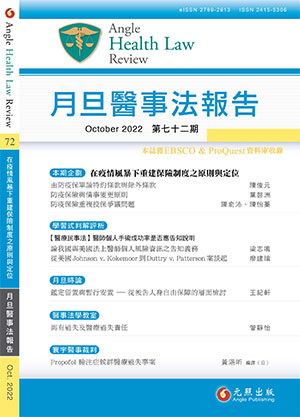Propofol輸注症候群醫療過失事案【寰宇醫事裁判】 試閱
Case about Medical Malpractice due to Propofol Infusion Syndrome
患者C於被告醫院ICU接受術後管理,3日後死亡。患者C之繼承人A與B主張,被告醫師過量投與麻醉劑Propofol,其於小兒人工呼吸管理過程為禁忌症,進而引發Propofol輸注症候群導致C死亡。東京地方法院認為,以原告於C的就醫過程紀錄中,可知其對使用麻醉劑有著謹慎、拒絕之態度,而被告卻未注意於此,只說明氣切之危險性而未提及長期使用麻醉劑之危險,是違反說明義務;另被告選擇麻醉劑、使用劑量與時間,並未注意文獻中對高劑量、長時間使用Propofol的危險性警告,亦忽略Propofol適用在小兒重症之人工呼吸管例為禁忌。C插管1日後,被告也並未考慮調整劑量、更換藥物,則難謂有使用禁忌症藥物之合理目的。因此,被告醫師存有過失,與C死亡間具因果關係。
Patient C died 3 days later after being managed in the intensive care unit of the issued hospital as the defendant. Patient’s successors, A and B, claimed that the defendant physician overdosed propofol, which was contraindicated during the administration of pediatric artificial respiration, resulting in C’s death due to the Propofol Infusion Syndrome. Tokyo District Court held that the plaintiff’s medical records showed that he was cautious and tended to refuse using anesthetics, but the defendant didn’t pay attention to this and only explained the danger of pneumothorax without mentioning the danger of prolonged use of anesthetics, which was a violation of the duty of disclosure. The defendant didn’t consider adjusting the dosage or changing the medication one day after intubation, so it couldn’t be said that there was a reasonable purpose for using the contraindicated medication. Therefore, the defendant physician was negligent and had a causal relationship with C’s death.
107-112






